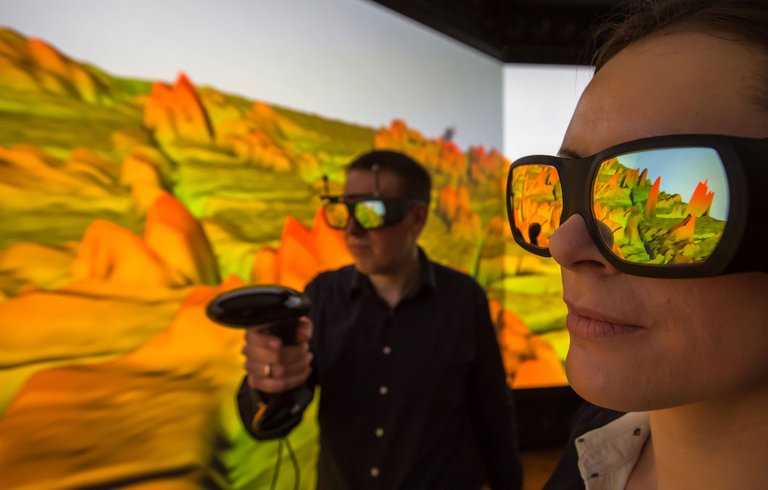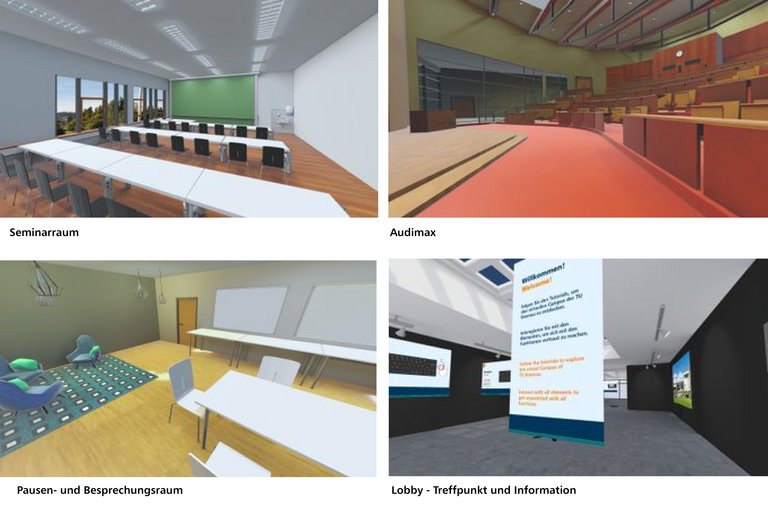In the winter semester 2022/23, the TU Ilmenau will for the first time offer the courses of the two English-language master's degree programs "Communications and Signal Processing" and "Media and Communication Science" in online/digital distance form in parallel to the classroom form and outside of pandemic conditions. As part of the project "VEDIAS - Preparation and testing of digital, internationally oriented study programs with social virtual reality application", the TU Ilmenau is currently developing innovative digital offerings for studying and teaching. The master's program Micro- and Nanotechnologies is also involved as a third study program.
TU to offer two international degree programs online in parallel to the classroom format starting in fall

The VEDIAS project, which started in 2021, will be funded by the German Federal Ministry of Education and Research with approximately 1.6 million euros for a period of two years and will be implemented within the framework of the DAADInternational Digital Programs call. It is part of the internationalization and digitization efforts of the TU Ilmenau: Innovative hybrid or fully digital teaching and examination formats are to be tested in various disciplines, for different qualification levels (Bachelor, Master) and target groups. Special attention will be paid to offerings for international students in the context of study preparation or participation in selected courses from their home country. The self-image of the TU Ilmenau as a presence university remains unaffected.
At the end of the first year of funding, the work has already progressed to such an extent that the two English-language master's programs involved, Communications and Signal Processing leading to a Master of Science degree and Media and Communication Science leading to a Master of Arts degree, will be able to start in the winter semester of 2022/23 as distance learning programs in parallel to the established face-to-face study formats of the same name. The Vice President for Studies and Teaching, Prof. Dr. Anja Geigenmüller:
For the further development of the university, it is of enormous importance to better understand the potentials, but also the limits of digital teaching. Digitization not only affects the design of online courses. It also challenges us in various administrative areas, including data protection, university law and quality management. This project gives us the necessary freedom to rethink not only online teaching formats, but also the associated regulations and processes, to learn from them, and to identify suitable solutions for us. This project and other projects in the area of digital teaching and digital examinations are therefore invaluable to us.
In addition to digitizing the teaching and study content of the three directly involved master's degree programs, the VEDIAS project is also expanding the competencies and framework conditions for developing further digital study offerings overall. Therefore, numerous structural units of the TU Ilmenau are involved in the implementation of the project, including, in addition to the faculties responsible for teaching, the University Computer Center, the Central Institute for Education, the Academic Service Center, the Student Advisory Service and the University Library. The central project management is in the International Office of the University. Head Sophia Siegfried is pleased that the TU Ilmenau's application was selected for funding and that significant successes were already achieved in the first year of the project:
With the VEDIAS project, we want to make the university's innovative profile in teaching and research more visible on an international level. At the same time, we want to further the internationalization of the TU Ilmenau by networking presence and distance students in internationally oriented, online/digitally studyable English-language courses.
The courses offered in the participating degree programs have been almost completely digitized and methodologically and didactically prepared for hybrid and online/digital teaching. To regulate the special provisions in distance learning, distance teaching and distance examinations outside of pandemic conditions, a digital statute for international study programs, the IPdigital statute, was developed and adopted. The statute is currently before the responsible ministry for approval. A student support and networking service has been developed to support digital students. Continuing education courses specially tailored to the new teaching formats and technologies used have been set up for teachers.
As a special technological innovation in teaching, a social virtual reality platform for online teaching is being tested as part of the VEDIAS project. The VR tool provides virtual lecture halls, seminar rooms, laboratories and a virtual lobby that recreate the on-site conditions at the TU Ilmenau. TheVirtual Campus of theTU Ilmenau was set up by the Department of Virtual Worlds and Digital Games on established software and already enabled the testing and use of virtual lectures and seminars in the first year of the project. VR glasses are not required for participation, and participants use customizable avatars to move around in the virtual spaces. Department head Prof. Dr. Wolfgang Broll:
The trial showed that the use of social virtual reality offers great potential for the development of new forms of technology-supported teaching. With the evaluation of the acceptance of these formats in the context of a longer-term use, this innovative approach to digital teaching is also highly interesting from a research perspective.
The VR-supported teaching sessions were followed by accompanying events organized by the we4you support network in the virtual lobby. The technology also proved to be very useful for extracurricular and intercultural communication between students and for establishing a personal connection to Ilmenau as a German study location.
The surveys of the students involved in the first trial phase in various subjects revealed further advantages of the VEDIAS model. The students were particularly positive about the multiple provision of course content, says Prof. Dr. Jens Müller, Vice President for International Relations and Transfer and responsible for the Micro- and Nanotechnologies program:
The participants consider it a considerable added value that the teaching content can be provided multiple times - for example in the form of a hybrid lecture and additionally as separately prepared video streams of lectures that can be called up permanently. This contributes significantly to a better understanding of the teaching content and consequently to greater learning success.
The shorter video lessons of 3 x 30 minutes, which were also tested, also proved to be beneficial in the student survey, as this gives students more time for follow-up, in which content that is more difficult to understand can be accessed again and in shorter sequences. Overall, it became clear that the development of high-quality technical solutions and their integration on standardized platforms is essential for the success of a digitization project such as VEDIAS.
The learning experiences from the 1st project year and the started 2nd project year should be taken up and the implementation of the VEDIAS project should be further advanced and solutions for still existing challenges should be found. For example, it became clear that the use of virtual lectures, interactive videos and screen experiments must first be practiced and that educational technologies, no matter how good they may be, cannot completely replace laboratory activities in practically oriented courses of study. In addition, the partners want to focus more on the question of sustainability of the project. In order to enable the exchange of experiences in this regard, various internal and cross-university discussion formats are to be used, starting with the Digital Teaching Day at the TU Ilmenau, which will be open to all interested teachers and the university public from Germany and abroad on March 29, 2022.
After the project evaluation, which is due at the end of 2022, the responsible committees of the TU Ilmenau will then decide whether the distance learning offers will be continued beyond the offer for the matriculation year 2022/23.
Those interested in the digital study offerings of the two master's programs "Communications and Signal Processing" and "Media and Communication Science" can apply here:
Ilmenau University of Technology
Prospective students can receive further information by e-mail:
Contact
Dr. Diana Moehrke-Rasul
VEDIAS-Coordination, International Office TU Ilmenau


